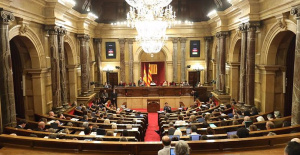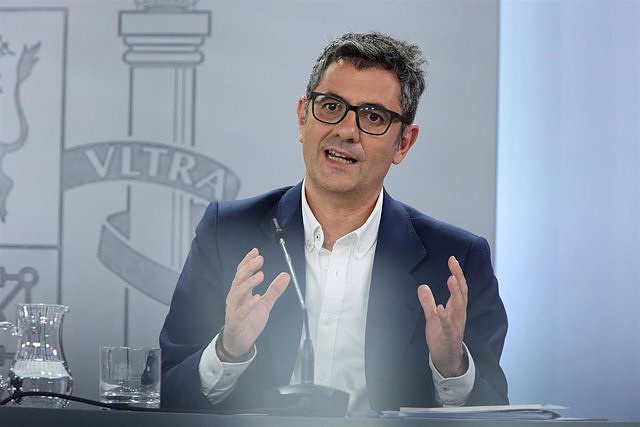The secrecy may be lifted ex officio by the competent authority or at the request of affected persons.
The new Classified Information Law, the draft of which was approved this Monday by the Council of Ministers, will not entail the automatic declassification of any of the documents already classified until now and that have met their deadlines, but rather this will be done gradually if they so decide. "ex officio" the competent authorities or at the request of affected persons who so request.
This was explained by the Minister of the Presidency, Félix Bolaños, at the press conference after the meeting of the Council of Ministers, in which he reported on the details of this draft, on which the advisory bodies will now have to pronounce.
The preliminary draft provides for a transitory regime of application. To begin with, it will not be in force until six months after its approval by the Cortes, which the Government calculates for the beginning of 2023.
Regarding the "huge" documentation already classified or that which is classified until then, in principle, it will remain as it is, although it may be declassified by the competent authorities "ex officio" or at the request of any person who has an interest in it.
According to Bolaños, the general rule will be "to allow declassification" unless it affects the security, defense of the State or the integrity of a specific person. At this point, the minister recalled that the military documents prior to 1968 were already declassified at the time by the Ministry of Defense.
In addition, the minister has detailed that the new regulations do not contemplate any special restriction for any institution, that is to say that the documents related to the Crown will not enjoy special protection.
The minister stressed that it is an "advanced and guaranteeing" law that replaces the current Francoist law and that homologates Spain with the "best standards" of advanced democracies in this area. "It was a pending issue", he commented, making it clear that from now on national security and defense will be guaranteed "in balance with the right to know".
The future law establishes four categories of classification: top secret, secret, confidential and restricted. The classification of the documents included in the first two will correspond to the Council of Ministers, while those of the other two will be left in the hands of a list of authorities ranging from ministers, to secretaries of state, undersecretaries, government delegates or the highest responsible for the National Intelligence Center, the Police or the Civil Guard, among others.
65 YEARS MAXIMUM
From the entry into force of the law, the maximum that information can remain secret will be 65 years. Specifically, for the top secret, a term of 50 years is set, extendable for another 15; the secret will be for 40, plus ten extension; the confidential between seven and ten years and the restricted between four and six.
Once the maximum deadlines have been met, it will have to be automatically declassified, although the initially set deadlines may be reviewed by the authority that classified the information that day if it considers that it can be published earlier.
"There is no possibility that something is classified for life," he asserted, pointing out that "normal" when the information "does not affect the security of the State or the protection or integrity of any person, "it can be brought forward" the lifting of the secret.
Bolaños has described these deadlines as "reasonable", pointing out that in Europe there are countries that do not set any time period for the publication of this type of document, such as Denmark, France, Italy or Belgium, which in Sweden, for example, is set at 70 years, and in Germany in 30 for top secret, secret and confidential.
In addition, alternatively, information may be classified based on certain or foreseeable future events such as the end of a war or the death of a person.
With the new norm, the National Authority for Classified Information will be created, dependent on the Ministry of the Presidency, and similar to the one that works in other countries, which will deal with top secret, secret or confidential classified information, as well as the coming from other states.
APPEAL BEFORE THE SUPREME
In addition, it will have advisory functions to the Government so that homogeneous criteria are set throughout the administration and will assess the suitability of the people who can access classified information.
Another novelty will be that, for the first time, a person directly affected will be able to request the declassification of any document and, if their request is not met, they will be able to appeal to the Contentious-Administrative Chamber of the Supreme Court, the same one that will be in charge to decide in the event that the request for declassification is part of a judicial proceeding.
The norm will also regulate access to classified information by deputies who are part of the Reserved Expenses Commission of Congress, which will be the competent body to "channel" the declassification requests made by their lordships. If so decided, they may be given access to it.

 Exploring Cardano: Inner Workings and Advantages of this Cryptocurrency
Exploring Cardano: Inner Workings and Advantages of this Cryptocurrency Seville.- Economy.- Innova.- STSA inaugurates its new painting and sealing hangar in San Pablo, for 18 million
Seville.- Economy.- Innova.- STSA inaugurates its new painting and sealing hangar in San Pablo, for 18 million Innova.- More than 300 volunteers join the Andalucía Compromiso Digital network in one month to facilitate access to ICT
Innova.- More than 300 volunteers join the Andalucía Compromiso Digital network in one month to facilitate access to ICT Innova.-AMP.- Ayesa acquires 51% of Sadiel, which will create new technological engineering products and expand markets
Innova.-AMP.- Ayesa acquires 51% of Sadiel, which will create new technological engineering products and expand markets The Prosecutor's Office requests 63 years in prison for Rato and a fine of more than 42 million euros
The Prosecutor's Office requests 63 years in prison for Rato and a fine of more than 42 million euros Marlaska puts more radars, surveillance on highways and motorists, and controls in the face of the increase in accidents
Marlaska puts more radars, surveillance on highways and motorists, and controls in the face of the increase in accidents Pedro Rocha, elected new president of the RFEF
Pedro Rocha, elected new president of the RFEF The PSC would win the elections with 40-47 seats and ERC is ahead of Junts, according to the CEO
The PSC would win the elections with 40-47 seats and ERC is ahead of Junts, according to the CEO How Blockchain in being used to shape the future
How Blockchain in being used to shape the future Not just BTC and ETH: Here Are Some More Interesting Coins Worth Focusing on
Not just BTC and ETH: Here Are Some More Interesting Coins Worth Focusing on The UA opens the call for the Impulso 2024 Awards for the best innovative business initiatives
The UA opens the call for the Impulso 2024 Awards for the best innovative business initiatives ALI, virtual assistant from Alicante, internationally recognized by the OECD
ALI, virtual assistant from Alicante, internationally recognized by the OECD Retrópolis brings the golden age of video games and computing to the UPV
Retrópolis brings the golden age of video games and computing to the UPV Looking for video games that value the neighborhoods of Valencia
Looking for video games that value the neighborhoods of Valencia A million people demonstrate in France against Macron's pension reform
A million people demonstrate in France against Macron's pension reform Russia launches several missiles against "critical infrastructure" in the city of Zaporizhia
Russia launches several missiles against "critical infrastructure" in the city of Zaporizhia A "procession" remembers the dead of the Calabria shipwreck as bodies continue to wash up on the shore
A "procession" remembers the dead of the Calabria shipwreck as bodies continue to wash up on the shore Prison sentences handed down for three prominent Hong Kong pro-democracy activists
Prison sentences handed down for three prominent Hong Kong pro-democracy activists ETH continues to leave trading platforms, Ethereum balance on exchanges lowest in 3 years
ETH continues to leave trading platforms, Ethereum balance on exchanges lowest in 3 years Investors invest $450 million in Consensys, Ethereum incubator now valued at $7 billion
Investors invest $450 million in Consensys, Ethereum incubator now valued at $7 billion Alchemy Integrates Ethereum L2 Product Starknet to Enhance Web3 Scalability at a Price 100x Lower Than L1 Fees
Alchemy Integrates Ethereum L2 Product Starknet to Enhance Web3 Scalability at a Price 100x Lower Than L1 Fees Mining Report: Bitcoin's Electricity Consumption Declines by 25% in Q1 2022
Mining Report: Bitcoin's Electricity Consumption Declines by 25% in Q1 2022 Oil-to-Bitcoin Mining Firm Crusoe Energy Systems Raised $505 Million
Oil-to-Bitcoin Mining Firm Crusoe Energy Systems Raised $505 Million Microbt reveals the latest Bitcoin mining rigs -- Machines produce up to 126 TH/s with custom 5nm chip design
Microbt reveals the latest Bitcoin mining rigs -- Machines produce up to 126 TH/s with custom 5nm chip design Bitcoin's Mining Difficulty Hits a Lifetime High, With More Than 90% of BTC Supply Issued
Bitcoin's Mining Difficulty Hits a Lifetime High, With More Than 90% of BTC Supply Issued The Biggest Movers are Near, EOS, and RUNE during Friday's Selloff
The Biggest Movers are Near, EOS, and RUNE during Friday's Selloff Global Markets Spooked by a Hawkish Fed and Covid, Stocks and Crypto Gain After Musk Buys Twitter
Global Markets Spooked by a Hawkish Fed and Covid, Stocks and Crypto Gain After Musk Buys Twitter Bitso to offset carbon emissions from the Trading Platform's ERC20, ETH, and BTC Transactions
Bitso to offset carbon emissions from the Trading Platform's ERC20, ETH, and BTC Transactions Draftkings Announces 2022 College Hoops NFT Selection for March Madness
Draftkings Announces 2022 College Hoops NFT Selection for March Madness



























